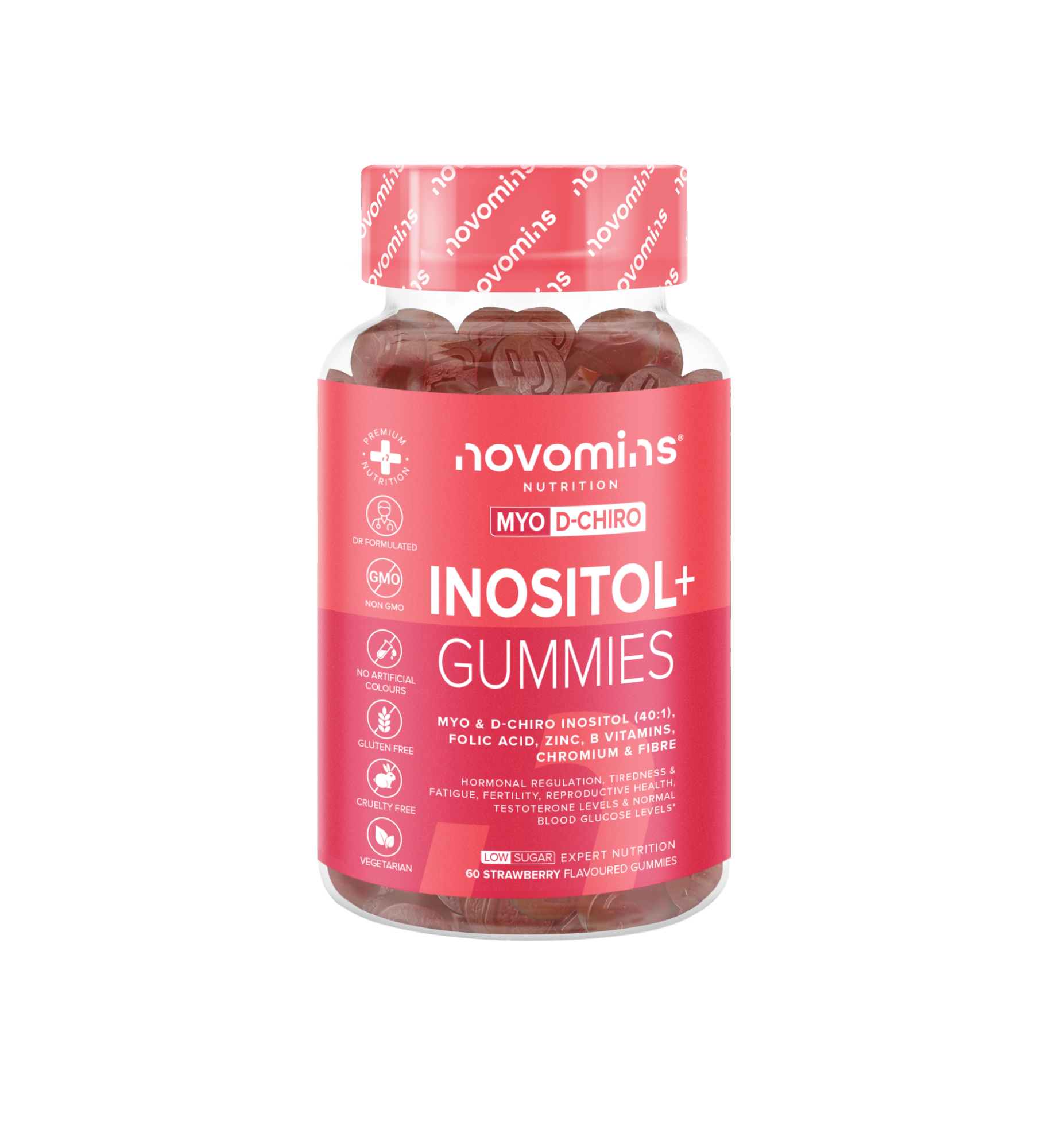In the fascinating world of health and supplements, myo-inositol and D-chiro inositol may not be as well known in the UK as vitamin C or probiotics. And their names definitely don't roll off the tongue.
However, inositol supplements can be a game-changer for your health, especially for conditions like PCOS and metabolic syndrome.
With PCOS affecting 1 in 10 women of reproductive age in the UK and metabolic syndrome affecting one in four adults in the UK, these stats highlight just how crucial inositol can be.
So, what exactly are myo-inositol and D-chiro-inositol? How do they differ, and more importantly, how can they benefit you? Stick around while we break it all down and explain how you can use myo inositol or D-chiro inositol to improve your health.
What are myo-inositol and d-chiro inositol?
Inositol (also known as myo-inositol) is a compound that’s closely related to glucose. It’s classified as a type of sugar alcohol and is often referred to as vitamin B8, although it’s not actually a vitamin.
While our bodies naturally produce inositol, it can also be found in everyday foods like fruits, beans, grains and nuts. It plays a crucial role in cell growth and functioning and helps with insulin function, a hormone that regulates blood glucose levels.
Inositol comes in up to nine forms, with myo-inositol and D-chiro inositol being the most common in supplements. However, both play different roles within the body.
Myo-inositol is the most abundant form of inositol and helps the body use glucose. It provides structure to your cells and influences the hormone insulin as well as the function of chemical messengers in the brain.
D-chiro inositol is produced from myo-inositol and is less abundant in the body. It’s involved in glycogen synthesis and storage and helps generate energy from sugar.
Both types have been found to benefit reproductive health, especially in women with PCOS (polycystic ovary syndrome). Myo-inositol can help regulate menstrual cycles, increase the frequency of ovulation, and improve egg and embryo quality, while D-chiro inositol can aid in healthy ovarian function.
Additionally, both forms of inositol help reduce elevated levels of androgens (male hormones) in women with PCOS, which can result in symptoms like acne and excessive hair growth.
Myo-inositol and D-chiro inositol also offer several benefits in terms of metabolic processes. Both compounds improve the body’s response to insulin, which is crucial for those with insulin resistance or type 2 diabetes, helping maintain healthy blood sugar levels.
What’s the difference between myo-inositol and D-chiro inositol?
While these two forms of inositol are incredibly similar and nearly identical on a molecular level, there is a difference between myo inositol and D-chiro inositol when it comes to insulin.
Myo-inositol helps the transporters' activation and the body's use of glucose, while D-chiro inositol is involved in glycogen synthesis and storage instead. Myo-inositol is also the most common form of inositol, produced by the body and found in foods, while d-chiro inositol is less abundant and made from myo-inositol via an enzyme called epimerase.
Roles and benefits in the body of myo-inositol vs D-chiro inositol
Myo-inositol:
Myo-inositol is essential for cell membrane formation and helps regulate menstrual cycles, improve ovarian function and enhance fertility in women with PCOS by improving insulin sensitivity and reducing androgen levels. It may also help alleviate symptoms of anxiety and depression.

D-chiro inositol:
D-chiro inositol also improves insulin sensitivity, crucial for anyone with insulin resistance or type 2 diabetes. It helps maintain healthy blood sugar levels and lowers insulin levels, which can also reduce androgen levels and improve PCOS symptoms.
What are the health benefits of myo initosol vs D-chiro inositol?
Reproductive health
Both myo-inositol and D-chiro inositol are known for their positive effects on reproductive health, especially in women with PCOS.
Studies show that both forms of inositol can help regulate menstrual cycles by reducing insulin levels and can be used in combination with each other. This led to a significant improvement in the hormonal and metabolic profile of PCOS patients.
Myo-inositol also increases ovulation rates. One study found women who took myo-inositol ovulated more frequently compared to the placebo group.
In addition, myo-inositol and D-chiro inositol reduce androgen levels, which are often increased in women with PCOS, alleviating symptoms like acne and hirsutism.

Metabolic health
Myo-inositol and D-chiro inositol are particularly effective in improving metabolic health. Studies show they significantly reduce blood glucose levels. They also improve insulin sensitivity, crucial for preventing and managing insulin resistance and type 2 diabetes.
Myo-inositol vs D-chiro inositol in PCOS treatment
Both forms of inositol are an effective and safe treatment in women with PCOS.
Myo-inositol is particularly beneficial and is found to restore ovulation by enhancing insulin sensitivity and decreasing insulin resistance, improving spontaneous ovulation or inducing ovulation in general.
In addition, combining both myo-inositol and D-chiro inositol reduces the risk of metabolic diseases in overweight PCOS patients. D-chiro inositol also induces ovulation in non-insulin-resistant young women with PCOS.
Research also indicates a combination of both inositols — with a 40:1 ratio between myo-inositol and D-chiro inositol — is most effective in restoring ovulation in women with PCOS.
What are the side effects of myo-inositol vs D-chiro inositol?
Inositol is considered safe by healthcare providers if taken for up to 10 weeks in low doses.
However, as with any supplement, myo-inositol and D-chiro inositol can cause mild side effects in some people. These include gastrointestinal issues like diarrhoea, nausea and abdominal pain, as well as fatigue, dizziness and headaches.
It’s worth noting that both types of inositol only work as a supplement when combined. When taken at the correct dose, neither myo-inositol nor D-chiro inositol should cause significant adverse effects.
If significant side effects do occur, stop taking your inositol supplements immediately. Contact your local GP for medical advice to rule out any underlying conditions or interactions with other medications.
Many people report positive experiences with inositol, confirming notable improvements in their health and sharing their experiences with side effects and how they managed them:
“Very effective for constipation and anxiety. Once you make up for any inositol deficiency you will get diarrhoea. Be sure to lower your dose to a maintenance level. You really have to figure out what works best for you.”
— Anonymous user, < WebMD>
“Taking this for PCOS for over a year and periods went from 178 days to 36 days, it’s been combined with lifestyle changes of reducing carb in take, or pairing carbs with more protein. You have to take it within 30 mins of your main meal and you need both types of inositol for it to be effective. Most supplements only have myo but you need the d form too. It’s clinically proven to improve pcos symptoms with both forms. I’ve had zero side effects.”
— Hm257, < WebMD>Real user experiences and success stories
People from various backgrounds and with different health challenges have found that inositol supplements are effective in improving their health. Here are some of their experiences and stories.
Condition: PCOS
“Got pregnant within a month of starting this after many months with no success.“
— NewGirl, < WebMD>
Condition: PCOS
“I was diagnosed with PCOS after coming off the pill. For the first 6 months off the pill, everything was ok. Then, amenorrhea and acne occurred and was diagnosed with PCOS by an endocrinologist. After 5 months of Ovasitol, acne has greatly decreased and menses have restarted. However, I am not sure what is linked to Ovasitol (D-Chiro+ Myo-Inositol) and what is just my body getting used to not being on the pill anymore... None of the doctors or endocrinologists I met knew about Inositol…”
— Anonymous user, < WebMD>
Condition - PCOS
“I took it for one month and found out I was pregnant after 1 year of struggling to get pregnant. I have PCOS.”
— Anonymous user, < WebMD>
Condition - PCOS
“I have had irregular periods for years and was Dx with mild PCOS. My cycle did not improve despite balanced nutrition and exercise, other than when I was on birth control of course. When I read on PubMed that inositol supplementation had some merit, I decided to give it a try. I have been taking 650 mg of inositol per day for about 5 months now. The first three months my cycle/period came like clockwork. Which has NEVER happened on its own. I became less diligent about taking the inositol my fourth month and surprise surprise my period did not come as expected. It is absolutely incredible how well this supplement has worked for my mild PCOS. I highly recommend you try it.”
— Twotree, < WebMD>
Condition: PCOS
“I immediately felt a difference when I started taking Inositol for PCOS. My mood was the first to improve, then came the weight loss, and now my hair is GROWING back. I highly recommend this for anyone with PCOS.”
— cheekymonkey, < WebMD>
What’s the best myo-inositol and D-chiro inositol supplement?
Inositol supplements come in various formats, including powders, capsules and delicious gummy supplements.
Inositol powder is usually mixed with water or another liquid and consumed as a drink, while capsules and gummies come in convenient, pre-measured doses. All can be effective for treating PCOS and metabolic disorders, and the best myo-inositol and d-chiro-inositol supplement for you will simply depend on your preferred format.
When choosing a high-quality supplement, check it contains both myo-inositol and D-chiro inositol. You’ll also want to ensure it matches the recommended 40:1 ratio for optimal results.
Look for pure inositol supplements without unnecessary fillers or additives that don’t provide additional health benefits. Additionally, always purchase from reputable companies that undergo rigorous third-party testing, like Novomins.
Our gummies are specifically formulated by our in-house team of doctors, scientists and nutritionists using only ethically sourced, high-quality ingredients that benefit your health.
Get your daily dose of inositol with Novomins gummies
Myo-inositol and D-chiro inositol are two forms of inositol available in the UK. They’re a compound closely related to glucose, are the most common forms of inositol found in supplements and help with insulin function, regulating blood glucose levels in the body.
Myo-inositol is the most abundant form compared to D-chiro inositol and helps the body use glucose. D-chiro inositol is produced from myo-inositol and is involved in glycogen synthesis and storage, helping generate energy from sugar.
Because they help with insulin function, they also help manage metabolic health conditions such as type 2 diabetes and insulin resistance.
Both are shown to be effective when it comes to regulating menstrual cycles, improving ovulation and enhancing fertility, making them an advantageous tool for women with PCOS.
Inositol supplements are generally considered safe but can cause mild side effects, such as diarrhoea, nausea, abdominal pain, fatigue, headaches and dizziness. That’s why following the recommended dose is essential to minimise the risk of adverse effects.
Ready to take the next steps towards better health? Whether you’re looking to manage PCOS or tackle insulin resistance, get your daily dose of inositol with Novomins gummies.
Our range of high-quality inositol supplements — including Novomins Night Gummies for better sleep, and myo-inositol and D-chiro-inositol Fertility Gummies for reproductive support — are designed to cater to your unique health needs. These gummies, formulated with high-quality ingredients, are non-GMO, taste delicious and fit into even the busiest daily routines.
FAQs
Do myo-inositol and D-chiro inositol help you lose weight?
Studies show combining myo-inositol and D-chiro inositol can result in weight loss in women with PCOS when supplemented alongside a healthy diet as a result of its positive effects on insulin resistance.
References:
- https://www.nhs.uk/conditions/polycystic-ovary-syndrome-pcos/
- https://www.heartuk.org.uk/genetic-conditions/metabolic-syndrome
- https://pubchem.ncbi.nlm.nih.gov/compound/Inositol
- https://pubmed.ncbi.nlm.nih.gov/7416064/
- https://www.sciencedirect.com/science/article/abs/pii/S1388198122000270
- https://www.ncbi.nlm.nih.gov/pmc/articles/PMC7346495/
- https://www.researchgate.net/figure/Structures-of-the-nine-stereoisomers-of-inositol-Inositol-exists-under-9-stereoisomeric_fig3_237839483
- https://www.ncbi.nlm.nih.gov/pmc/articles/PMC10145676/
- https://www.ncbi.nlm.nih.gov/pmc/articles/PMC5078644/
- https://www.inositoli.it/en/
- https://www.ncbi.nlm.nih.gov/pmc/articles/PMC5350329/
- https://pubmed.ncbi.nlm.nih.gov/25893270/
- https://www.ncbi.nlm.nih.gov/pmc/articles/PMC5040057/
- https://pubmed.ncbi.nlm.nih.gov/27882052/
- https://www.inositoli.it/en/the-difference-between-inositol-myo-inositol-and-d-chiro-inositol/
- https://www.inositoli.it/en/the-difference-between-inositol-myo-inositol-and-d-chiro-inositol/
- https://www.ncbi.nlm.nih.gov/pmc/articles/PMC5078644/
- https://www.ncbi.nlm.nih.gov/pmc/articles/PMC8227031/
- https://www.ncbi.nlm.nih.gov/pmc/articles/PMC10926319/
- https://pubmed.ncbi.nlm.nih.gov/34624138/
- https://pubmed.ncbi.nlm.nih.gov/15206484/
- https://www.ncbi.nlm.nih.gov/pmc/articles/PMC7346495/
- https://pubmed.ncbi.nlm.nih.gov/36703143/
- https://www.ncbi.nlm.nih.gov/pmc/articles/PMC7729761/
- https://www.ncbi.nlm.nih.gov/pmc/articles/PMC10926319/
- https://journal.barpetaogs.co.in/pdf/0571.pdf
- https://www.ncbi.nlm.nih.gov/pmc/articles/PMC8503791/
- https://www.ncbi.nlm.nih.gov/pmc/articles/PMC7140126/
- https://www.researchgate.net/publication/51575304_Inositol_safety_Clinical_evidences
- https://pubmed.ncbi.nlm.nih.gov/18074942/
- https://pubmed.ncbi.nlm.nih.gov/30915778/





